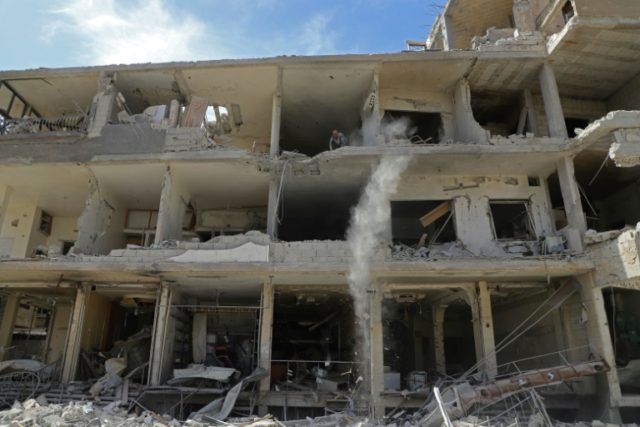The Syrian government has reportedly begun a land invasion of the Damascus suburb of Eastern Ghouta, following a brutally intense two-week campaign of airstrikes and artillery bombardments that killed hundreds of people.
The ground attack was launched in defiance of a U.N. Security Council resolution to halt what Secretary-General Antonio Guterres called “hell on earth,” and in spite of Russia’s plan for a daily humanitarian pause in airstrikes.
Reuters notes that the plan for five-hour daily pauses was immediately violated on Tuesday, the first day it was supposed to be in effect, and while a five-hour bombing pause technically occurred on Wednesday, there was “no sign of aid deliveries to the besieged area.”
Russia and Turkey said they were able to arrange the evacuation of some 700 civilians from Eastern Ghouta, but outside observers said they could not confirm the evacuation took place, and the Turkish government conceded the civilians were not brought to Turkey for medical treatment as President Recep Tayyip Erdogan wanted. An elderly Pakistani couple was reportedly able to escape the area with the help of the Syrian Arab Red Crescent.
The United Nations said on Thursday that Russia’s brief daily bombing pauses were insufficient to allow for the safe evacuation of civilians or the delivery of vitally needed humanitarian assistance.
“The people of Eastern Ghouta mock the news of exit corridors—they did not believe it for a second because they have lost all confidence in the regime’s credibility—particularly because the shelling has not stopped, and neither the Russians nor the regime have expressed any seriousness in keeping civilians out of the war,” said local activist Abdelmalik Aboud.
“The shelling has not stopped. The regime has not abided by the timings of the ceasefire. The violations of the truce are constant—24 hours a day,” he added.
According to the Syrian Observatory for Human Rights, an activist group based in London, the Syrian military actually tried to mount a ground invasion of Eastern Ghouta on February 25, but was repulsed with heavy losses by rebel forces. Rebel spokesmen said the battle now underway is also a “back and forth” contest, while Syrian commanders insisted the elite “Tiger Force” unit was involved and making progress against the rebels.
Many observers see Russian planning behind the Eastern Ghouta offensive and believe it is meant to be a reprise of the same tactics used in the long-besieged city of Aleppo.
Reuters quotes a Western diplomat who describes the strategy as creating intolerable conditions for civilians, which eventually leads to negotiations for evacuating the civilian population, giving the Russians and Syrian government forces a clean shot at the “terrorists” who remain, while either disrupting or destroying groups opposed to Assad’s rule. If anything, this “siege, starve, and surrender” strategy is being applied to Eastern Ghouta even more vigorously than it was to Aleppo.
The plan for Eastern Ghouta apparently involves the use of chemical weapons to create the desired “hell on earth” conditions, as the United States said there is evidence Syrian forces deployed chlorine gas and blamed Russia for failing to eliminate dictator Bashar Assad’s weapons of mass destruction as promised.
General Joseph Votel, head of the U.S. Central Command, told the House Armed Services Committee on Tuesday that Russia is causing problems in Syria and then offering itself as the solution to expand its influence.
“Diplomatically and militarily, Moscow plays both arsonist and firefighter, fueling tensions among all parties in Syria—the Syrian regime, Iran, Turkey, the Syrian Democratic Forces, the United States and other coalition partners—then serving as an arbiter to resolve disputes,” said Votel.
“It is clear that Russia’s interests in Syria are Russia’s interests and not those of the wider international community,” he charged.
Late on Thursday afternoon, U.N. officials said the Syrian government might permit humanitarian aid convoys to enter Eastern Ghouta within the next two days, and several dozen trucks are standing by to take advantage of the opportunity.

COMMENTS
Please let us know if you're having issues with commenting.